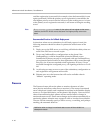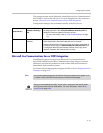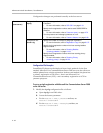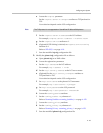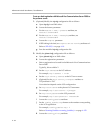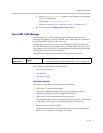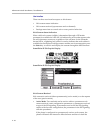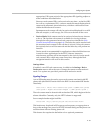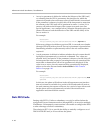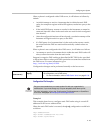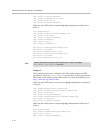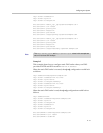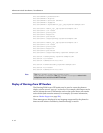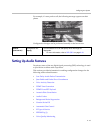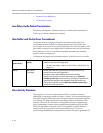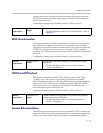
Administrator’s Guide SoundPoint IP / SoundStation IP
4 - 68
• An expires parameter is defined to indicate the lifespan of the URL itself,
or, assuming that the URL is permanent, the time span for which the
content is expected to have relevance to the call with which it is associated.
If the parameter is absent or invalid, this will be interpreted to mean that
the content or the URL itself will be persistent in nature. A value, if it is
present, will indicate the lifespan of the content in seconds (zero has
special significance—see example below). When the lifespan expires, the
phone will remove both the indication of the URL and the ability of the
user to retrieve it.
For example:
Access-URL:
<http://server.polycom.com/content23456.xhtml>;expires=60
If the server wishes to invalidate a previous URL, it can send a new header
(through UPDATE) with expires=0. The expires parameter is ignored when
determining whether to spontaneously retrieve the web content unless
expires=0.
• A mode parameter is defined to indicate whether the web content should
be displayed spontaneously or retrieved on-demand. Two values are
allowed: active and passive. If the parameter is absent or invalid, this will
be interpreted the same as passive, meaning that the web content will be
retrievable on-demand but will not be spontaneously displayed. If the
value is set to active, the web content will be spontaneously displayed,
subject to the rules discussed under Active Mode in Web Content
Retrieval on page 4-66.
For example:
Access-URL:
<http://server.polycom.com/content23456.xhtml>;expires=60;mode
=passive
In this case, the phone will indicate in the call appearance user interface
that web content is available for a period of 60 seconds and will retrieve
the web content at the request of the user for a period of up to 60 seconds
but the phone will not spontaneously switch to the microbrowser
application and download the content.
Static DNS Cache
Starting with SIP 2.1.0, failover redundancy can only be utilized when the
configured IP server hostname resolves (through SRV or A record) to multiple
IP addresses. Unfortunately, some customer’s are unable to configure the DNS
to take advantage of failover redundancy.
The solution in SIP 3.1 is to provide the ability to statically configure a set of
DNS NAPTR SRV and/or A records into the phone.



